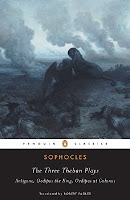For what’s striking about Oedipus’s predicament is how hard he has tried to avoid it. It’s not as though he ends up killing his father and sleeping with his mother by accident, out of some negligence or lapse. Rather, he’s spent the better part of his life trying to ensure that he never sees his parents again. All from the very best of intentions.
Oedipus is in every sense of the term (except the one that counts) a “good guy.” He works ardently for both public and private good, and is loved by all for his efforts. He wears his heart on his sleeve and never shirks responsibility: “Here I am myself [. . .] I am Oedipus” (7, 8). Called upon to resolve the trauma Thebes is suffering, to rid the city of the plague, he pledges to do his best in every way, and to put all of his formidable energy to work. He feels his people’s pain: “I have wept through the nights, you must know that, / groping, laboring over many paths of thought” (78-9). He’s no distant tyrant, savoring the delights of power and luxury. He feels personally invested in the search for the old king Laius’s murderer, even though it happened before he arrived in the city, even though it would be easy enough simply to blame the people who were there then for burying the trauma at the time.
In short, Oedipus is the very model of the ideal modern politician. Would that there were more like him. And not only because at the end he (almost literally) falls on his sword for something that was not really his fault, assuming responsibility for a disaster he never intended to bring about and circumstances that he could never have avoided.
Except that the irony is that if it weren’t for his impeccably good intentions, everything would undoubtedly have turned out very differently. It was only because he fled Corinth, seeking to avoid his fate, that he met Laius at the crossroads. And it was only because he solved the Sphinx’s riddle, so freeing Thebes from the monster’s malevolent presence, that he can marry Jocasta and taint her, too, with the blot of incestuous union.
In other words, it’s not just that his good intentions don’t save him. They are what get him into all this trouble in the first place. They are his tragic flaw.
All too often over the past decade or so, politicians have tried to cloak themselves in the defence of good intentions. Some years back David Runciman wrote a marvelous article about Tony Blair, who appealed always to his own high-minded humanitarianism and sense of conscience as exculpation for the disasters that ensued on his watch. Indeed, in part this was precisely his justification (for example) for the war on Iraq: yes, the people in their hundreds of thousands demonstrated in the streets against military action on such a shaky foundation. But the Prime Minister argued that the fact that he went to war anyway (whether or not he "sexed up" dodgy dossiers and the like en route) showed that he was not some populist swayed by the views of the many. He was a principled man who followed his own sense of right and wrong.
My colleague and friend Max Cameron at the Centre for the Study of Democratic Institutions would no doubt applaud this concern for morality and ethics amid--and against--the tumult of democratic politics.
There's no need to doubt the intentions. We might even be prepared to admit that Blair was and is a "good" man. Precisely the kind of good person that some want to see more of in politics. But if Blair's example alone isn't enough, then Oedipus the King reminds us of the bad that good men do.
Or to put it another way: this is a further argument against meritocracy, our contemporary form of what the Greeks themselves called "aristocracy."

